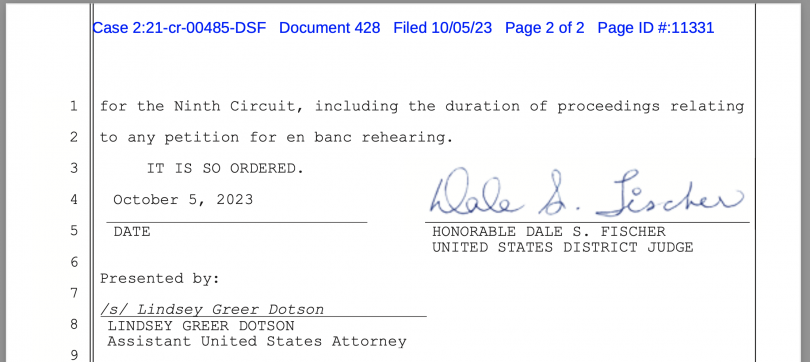A bit after 6 p.m on Thursday evening, October 5, U.S. District Court Judge Dale S. Fischer granted bail to Mark Ridley-Thomas.
This means that the former state senator, former assemblyman, former member of the board of supervisors, and twice-city council member will be able to remain out of prison while he and his new team of attorneys bring his case to the 9th Circuit Court of Appeals.
He had been scheduled to surrender to U.S. Marshals on November 13, at which time he would begin his three-and-a-half year term.
As WitnessLA reported earlier this week, on Monday, Oct. 2, the defense attorneys for Ridley-Thomas filed a 37-page motion requesting bail for their client while he appeals to the 9th.
This evening’s order was a happy surprise for the supporters of the 68-year-old policymaker and his defense team.
For one thing, Judge Fischer—who was the jurist who presided over Ridley-Thomas’s bribery and corruption trial in March of this year—had until the end of October to rule on the bail matter.
Also, it was far from clear that Fischer was going to rule in favor of bail for Ridley-Thomas.
Doubts about whether Judge Fischer would grant bail were not aided by the fact that, during the hearing at the end of August at which the judge sentenced MRT to 42 months in federal prison, she made a number of statements about “deterrence” being “an extremely important factor in this case,” along with similar sentiments of that general nature.
Today’s other surprise came from the team of federal prosecutors who brought the original charges against MRT, which resulted in his conviction on seven out of 19 federal counts.
The prosecution reportedly had until October 16, to file their own brief on the question of bail, which many assumed the government would oppose.
But the feds didn’t oppose bail.
Instead, an hour or two before Judge Fischer signed the bail order, the government filed a 5-page “stipulation” saying they were okay with bail as long as the defense agreed to a few conditions.
“To expedite the appellate process and obtain a final resolution of this case in a timely manner,” the prosecution wrote, the government didn’t oppose bail, if all the parties signed off on a couple of things.
Specifically, the prosecutors—and Judge Fischer— stipulated that if the defense team’s appeal to the 9th ended up becoming a two-step process in which the defense elected to go beyond a ruling by a three-judge panel to ask for what is known as an en banc hearing, the government would not object to Ridley-Thomas remaining out on bail for the second hearing.
However, if MRT did not succeed at the 9th, and wished to appeal the case to the U.S. Supreme Court, the prosecution and the judge required the defense to agree that they wouldn’t ask for bail should they appeal to SCOTUS.
The last thing that government required was for both the defense and the prosecution to jointly request to expedite the appealing, asking the 9th to set oral arguments for the earliest available date.
And, just in case the defense had any doubt, the prosecutors made a point of mentioning that the government did not, in fact, agree with the actual merit of the issues Ridley-Thomas and his attorneys raised in their bail motion.
(One presumes that, among the issues with which the feds didn’t agree, are such matters as the defense’s contention that during jury selection the government wrongly and unconstitutionally struck two Black women from the jury panel.)
Yet, although the government wrote that it “disputes the merits” of the issues raised in defense’s bail motion and “does not waive any argument with respect to any of those issues,” the prosecutors did agree that Ridley-Thomas and his lawyers have satisfied the “legal threshold” necessary to secure bail pending appeal.
Also, in case anyone had such concerns, the government noted that Ridley-Thomas had “met his burden of establishing by clear and convincing evidence that he is not likely to flee or pose a danger to any other person or the community.”
In the end, Ridley-Thomas’s high-profile group of appellate attorneys appeared pleased with the agreement, and signed off on the stipulations early Thursday night.
“Today’s decision by the U.S. Attorney’s Office to agree that Mark Ridley-Thomas should be granted bail pending appeal is a positive step forward,” said Alyssa D. Bell, partner at Cohen Williams LLP, and one of MRT’s four appellate attorneys.
Today’s events, Bell said, further underscore that the issues raised in the defense’s bail motion filed on Monday present “substantial questions,” and should be seen as an “acknowledgement of the strength of his upcoming appeal.”
Paul J. Watford, another member of Ridley-Thomas’s appellate team, also characterized the prosecution’s willingness not to oppose bail as a good sign.
He and his colleagues were “pleased,” Watford said, “that the government has agreed that Mark Ridley-Thomas’s appeal of his conviction presents at least substantial questions that are fairly debatable” by the Judges of the Ninth Circuit.
Paul Watford, as readers may remember, was himself judge for the Ninth District for 11 years before returning to private practice, so presumably has a broad base of experience in such matters.
More as it happens…. so watch this space

